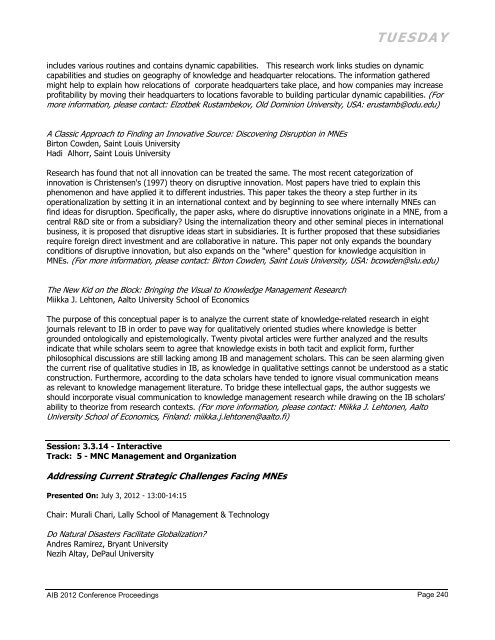AIB 2012 Conference Proceedings - Academy of International ...
AIB 2012 Conference Proceedings - Academy of International ...
AIB 2012 Conference Proceedings - Academy of International ...
You also want an ePaper? Increase the reach of your titles
YUMPU automatically turns print PDFs into web optimized ePapers that Google loves.
TUESDAY<br />
includes various routines and contains dynamic capabilities. This research work links studies on dynamic<br />
capabilities and studies on geography <strong>of</strong> knowledge and headquarter relocations. The information gathered<br />
might help to explain how relocations <strong>of</strong> corporate headquarters take place, and how companies may increase<br />
pr<strong>of</strong>itability by moving their headquarters to locations favorable to building particular dynamic capabilities. (For<br />
more information, please contact: Elzotbek Rustambekov, Old Dominion University, USA: erustamb@odu.edu)<br />
A Classic Approach to Finding an Innovative Source: Discovering Disruption in MNEs<br />
Birton Cowden, Saint Louis University<br />
Hadi Alhorr, Saint Louis University<br />
Research has found that not all innovation can be treated the same. The most recent categorization <strong>of</strong><br />
innovation is Christensen's (1997) theory on disruptive innovation. Most papers have tried to explain this<br />
phenomenon and have applied it to different industries. This paper takes the theory a step further in its<br />
operationalization by setting it in an international context and by beginning to see where internally MNEs can<br />
find ideas for disruption. Specifically, the paper asks, where do disruptive innovations originate in a MNE, from a<br />
central R&D site or from a subsidiary Using the internalization theory and other seminal pieces in international<br />
business, it is proposed that disruptive ideas start in subsidiaries. It is further proposed that these subsidiaries<br />
require foreign direct investment and are collaborative in nature. This paper not only expands the boundary<br />
conditions <strong>of</strong> disruptive innovation, but also expands on the "where" question for knowledge acquisition in<br />
MNEs. (For more information, please contact: Birton Cowden, Saint Louis University, USA: bcowden@slu.edu)<br />
The New Kid on the Block: Bringing the Visual to Knowledge Management Research<br />
Miikka J. Lehtonen, Aalto University School <strong>of</strong> Economics<br />
The purpose <strong>of</strong> this conceptual paper is to analyze the current state <strong>of</strong> knowledge-related research in eight<br />
journals relevant to IB in order to pave way for qualitatively oriented studies where knowledge is better<br />
grounded ontologically and epistemologically. Twenty pivotal articles were further analyzed and the results<br />
indicate that while scholars seem to agree that knowledge exists in both tacit and explicit form, further<br />
philosophical discussions are still lacking among IB and management scholars. This can be seen alarming given<br />
the current rise <strong>of</strong> qualitative studies in IB, as knowledge in qualitative settings cannot be understood as a static<br />
construction. Furthermore, according to the data scholars have tended to ignore visual communication means<br />
as relevant to knowledge management literature. To bridge these intellectual gaps, the author suggests we<br />
should incorporate visual communication to knowledge management research while drawing on the IB scholars'<br />
ability to theorize from research contexts. (For more information, please contact: Miikka J. Lehtonen, Aalto<br />
University School <strong>of</strong> Economics, Finland: miikka.j.lehtonen@aalto.fi)<br />
Session: 3.3.14 - Interactive<br />
Track: 5 - MNC Management and Organization<br />
Addressing Current Strategic Challenges Facing MNEs<br />
Presented On: July 3, <strong>2012</strong> - 13:00-14:15<br />
Chair: Murali Chari, Lally School <strong>of</strong> Management & Technology<br />
Do Natural Disasters Facilitate Globalization<br />
Andres Ramirez, Bryant University<br />
Nezih Altay, DePaul University<br />
<strong>AIB</strong> <strong>2012</strong> <strong>Conference</strong> <strong>Proceedings</strong><br />
Page 240

















